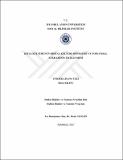DSpace Repository
KİTLE KÜLTÜRÜNÜN DİJİTAL KÜLTÜRE DÖNÜŞÜMÜ VE TOPLUMSAL ETKİLERİNİN İNCELENMESİ
JavaScript is disabled for your browser. Some features of this site may not work without it.
| dc.contributor.author | Kılınç, Meriç
|
|
| dc.date.accessioned | 2019-05-28T06:20:14Z | |
| dc.date.available | 2019-05-28T06:20:14Z | |
| dc.date.issued | 2017 | |
| dc.identifier.uri | http://hdl.handle.net/11547/2248 | |
| dc.description.abstract | Sanayi devriminin ardından toplumsal yapıda da önemli değişimler gerçekleşmiştir. Seri üretimin başlamasıyla, kişiye özgü ürünlerin yerini kitle için üretilen standart ürünler almaya başlamıştır. Teknolojideki gelişim iletişim teknolojilerini de geliştirmiş, sözlü ve yazılı iletişime, enformasyon devrimi ile birlikte görsel ve işitsel iletişim araçları da eklenmiştir. Dünya 'evrensel bir köy'e dönüşürken, İletişim teknolojileri sayesinde ortak enformasyon üretmek, almak ve göndermek olabildiğince hızlı ve kolay bir hal almıştır. Bu teknolojinin gelişimiyle ortaya çıkan yeni medya kavramının temel özellikleri, bir kişiden çok kişiye iletişimi sağladığı kadar ayrıca birebir iletişimi de mümkün kıldığı ve yeni araçlar ve yöntemler sunan bir iletişim devrimi sürecine sahip olduğudur. Araştırmamızın gerekliliğini ortaya çıkaran etkenler arasında gündelik yaşam içerisinde özellikle gençler üzerinden onların yeni iletişim araçlarını kullanımları esnasında yaşamış oldukları bireysel ve toplumsal iletişim ve etkileşimleri noktasındaki gözlemler belirleyici olmuştur. Bu amaçla İstanbul’da vakıf üniversitelerinde eğitim gören önlisans, lisans ve lisansüstü öğrencilerinin çerçevesinde yeni medya kullanım alışkanlıkları incelenmiştir. Araştırmanın çalışma grubunu 299 genç oluşturmaktadır. Bu kişilerle yapılan anketler üzerinden, sosyal medya uygulamalarını kullanıp kullanmadıkları, hangi sosyal medya ağlarına üye oldukları, sosyal medya ağlarını ne sıklıkla kullandıkları, sosyal medya ortamlarını hangi amaçla kullandıkları gibi sorular sorularak dijital kültür ile bağları incelenmiştir. | tr_TR |
| dc.language.iso | tr | tr_TR |
| dc.publisher | İSTANBUL AYDIN ÜNİVERSİTESİ SOSYAL BİLİMLER ENSTİTÜSÜ | tr_TR |
| dc.subject | Yeni medya | tr_TR |
| dc.subject | Kitle kültürü | tr_TR |
| dc.subject | Dijital kültür | tr_TR |
| dc.subject | Tekno kültür | tr_TR |
| dc.subject | Kültür endüstrisi | tr_TR |
| dc.subject | New media | tr_TR |
| dc.subject | Mass culture | tr_TR |
| dc.subject | Digital culture | tr_TR |
| dc.subject | Techno culture | tr_TR |
| dc.subject | Culture industry | tr_TR |
| dc.title | KİTLE KÜLTÜRÜNÜN DİJİTAL KÜLTÜRE DÖNÜŞÜMÜ VE TOPLUMSAL ETKİLERİNİN İNCELENMESİ | tr_TR |
| dc.type | Thesis | tr_TR |
| dc.description.abstractol | Significant changes took place in the social structure following the industrial revolution. By the start of the mass production, the customized products have begun to receive standard products which are produced for mass production. The development in technology has also improved communication technologies, including face-to-face and written communication, as well as visual and audio communication tools after the information revolution. As the world transforms into a “universal village”, communication technology has made it as quick and easy as possible to produce, receive and send common information. The key features of the new media concept emerging from the development of this technology are that it has a process of communication revolution that provides new means and methods, as well as personal communication, as well as individual to multi-person communication. Observations at the point of individual and societal communication and interactions that they have experienced during the use of their new means of communication, especially through young people, in everyday life have been determinants of the necessity of our research. For this purpose, new media usage habits in the framework of undergraduate, undergraduate and graduate students studying at foundation universities in Istanbul have been examined. The study group of the study is composed of 299 young people. Through these surveys, they were asked to ask questions such as whether they use social media applications, which social media networks they use, how often they use social media networks, and how they use social media media to examine their relationship with digital culture. | tr_TR |
| dc.publisher.firstpagenumber | 1 | tr_TR |
| dc.publisher.lastpagenumber | 112 | tr_TR |
Files in this item
This item appears in the following Collection(s)
-
Tezler -- Thesis [3438]
